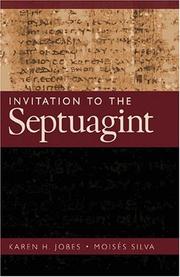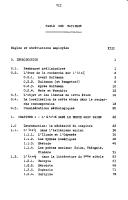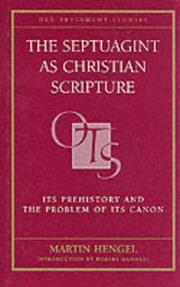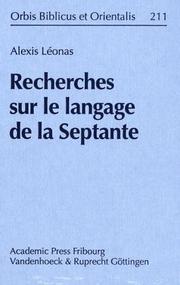| Listing 1 - 10 of 81 | << page >> |
Sort by
|

ISBN: 0801022355 9780801031151 080103115X 9780801022357 Year: 2005 Publisher: Grand Rapids: Baker Academic,
Abstract | Keywords | Export | Availability | Bookmark
 Loading...
Loading...Choose an application
- Reference Manager
- EndNote
- RefWorks (Direct export to RefWorks)
221.02*3 --- 221.02*3 Oud Testament: bijbelse filologie: grieks septuagint --- Oud Testament: bijbelse filologie: grieks septuagint --- Oud Testament: bijbelse filologie: grieks; septuagint --- 221.02*3 Oud Testament: bijbelse filologie: grieks; septuagint --- Bible. --- Versions --- Septuagint. --- Bible --- Septuagint
Book
Year: 1820 Publisher: Lipsiae : in libraria Weidmannia. Impressit Benedict. Gotthilf Tevbner,
Abstract | Keywords | Export | Availability | Bookmark
 Loading...
Loading...Choose an application
- Reference Manager
- EndNote
- RefWorks (Direct export to RefWorks)

ISBN: 3820477322 9783820477320 Year: 1983 Volume: 213 Publisher: Frankfurt am Main: Lang,
Abstract | Keywords | Export | Availability | Bookmark
 Loading...
Loading...Choose an application
- Reference Manager
- EndNote
- RefWorks (Direct export to RefWorks)
Bible --- #GROL:SEMI-221.08*3 --- 22.02*3 --- Bijbelse filologie: grieks --- 22.02*3 Bijbelse filologie: grieks
Book
ISBN: 9783161517334 3161517334 Year: 2012 Volume: 83 Publisher: Tübingen: Mohr Siebeck,
Abstract | Keywords | Export | Availability | Bookmark
 Loading...
Loading...Choose an application
- Reference Manager
- EndNote
- RefWorks (Direct export to RefWorks)
Book
ISBN: 9789042929784 9042929782 Year: 2014 Volume: 70 Publisher: Leuven: Peeters,
Abstract | Keywords | Export | Availability | Bookmark
 Loading...
Loading...Choose an application
- Reference Manager
- EndNote
- RefWorks (Direct export to RefWorks)
The finding of the pronounced divine name Iao freely used in a LXX MS from Qumran “has left many scholars baffled” (Kristin de Troyer). This name is best known from gnostic and magical sources, but till now no one has provided a history of its background prior to its move into these genres, necessary for placing it in the LXX’s textual tradition and understanding the chronology of the gradual disuse of God’s name in non-mystical contexts. This book presents new evidence (especially onomastic and classical) for, and reveals problems with prior scholarship’s positions on, the continued non-mystical pronunciation of the divine name among some within second temple period Judaism, and precisely when the name Iao moved into the mystical sphere. Key matters addressed include the divine name’s forms in the LXX and NT. The work also contains the first English translation and commentary of Byzantine polymath John Lydus’ chapter on the Jewish God from De mensibus 4.53.

ISBN: 0567087379 9780567087379 Year: 2002 Publisher: Edimbourg: Clark,
Abstract | Keywords | Export | Availability | Bookmark
 Loading...
Loading...Choose an application
- Reference Manager
- EndNote
- RefWorks (Direct export to RefWorks)
Book
ISBN: 9783161507472 9783161507489 3161507487 3161507479 3161612892 Year: 2020 Publisher: Tübingen: Mohr Siebeck,
Abstract | Keywords | Export | Availability | Bookmark
 Loading...
Loading...Choose an application
- Reference Manager
- EndNote
- RefWorks (Direct export to RefWorks)
The Hebrew Bible has played an important part in the development of Western culture. However, its central ideas – such as monotheism, the demythologization of nature or the linearity of time – had to be taken out of the national and linguistic milieu in which they had developed if they were to to become fertile on a wider scale. They also needed to be rendered palatable to a mentality that had experienced the scientific, rationalist revolution prepared by the Greeks. The Septuagint – the oldest Greek translation of the Jewish Bible, produced over the third and second centuries BC – is the first important step in this process of acculturation.Over the last twenty years the Septuagint has come out of the shadow of its Hebrew source. Historians of Judaism, linguists, and biblical scholars have come to view the Septuagint as a significant document in its own right. As the discoveries in Qumran have shown, the Hebrew source text of the Septuagint was not identical to the traditional text received by the synagogue (the Masoretic Text). Also, the translators appear to have taken a degree of liberty in interpreting the text. Dominique Barthélemy used the term 'aggiornamento': the Septuagint is a kind of update of the Jewish scriptures.This large-scale collective and interdisciplinary project aims to produce a new research tool: a multi-volume dictionary providing a comprehensive article (around 500 articles in all) for each important word or word group of the Septuagint. Filling an important gap in the fields of ancient philology and religious studies, the dictionary is based on original research of the highest scientific level.
Book
ISBN: 0310430011 Year: 1980 Publisher: Grand Rapids : Zondervan Pub. House,
Abstract | Keywords | Export | Availability | Bookmark
 Loading...
Loading...Choose an application
- Reference Manager
- EndNote
- RefWorks (Direct export to RefWorks)
Greek language, Biblical --- Grec biblique --- Grammar --- Grammaire --- 221.02*3 Oud Testament: bijbelse filologie: grieks; septuagint --- Oud Testament: bijbelse filologie: grieks; septuagint --- -221.02*3 Oud Testament: bijbelse filologie: grieks; septuagint --- 221.02*3 --- Bible. --- Versions --- Septuagint.
Book
ISBN: 9783525532614 9783647532615 352553261X Year: 2011 Volume: 241 Publisher: Göttingen: Vandenhoeck und Ruprecht,
Abstract | Keywords | Export | Availability | Bookmark
 Loading...
Loading...Choose an application
- Reference Manager
- EndNote
- RefWorks (Direct export to RefWorks)
Bible --- Language, style --- 221.02*3 --- Oud Testament: bijbelse filologie: grieks; septuagint --- 221.02*3 Oud Testament: bijbelse filologie: grieks; septuagint --- Bible. --- Language, style. --- Biblia

ISBN: 3727815108 3525530692 9783727815102 Year: 2005 Volume: 211 Publisher: Fribourg: Academic press,
Abstract | Keywords | Export | Availability | Bookmark
 Loading...
Loading...Choose an application
- Reference Manager
- EndNote
- RefWorks (Direct export to RefWorks)
| Listing 1 - 10 of 81 | << page >> |
Sort by
|

 Search
Search Feedback
Feedback About UniCat
About UniCat  Help
Help News
News